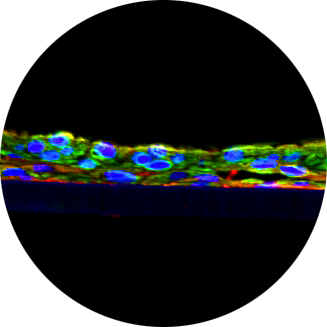Intestine Cell Culture Models
Mattek’s EpiIntestinal™ model is a cutting-edge product that has revolutionized the way that researchers study the human small intestine. This advanced cell culture model is made from human small intestinal cells, providing an in vitro testing environment that is much more accurate and reliable than traditional cell cultures. The EpiIntestinal model is an essential tool for researchers looking to understand the complex processes that take place within the human small intestine and to develop new treatments for a range of gastrointestinal diseases.
One of the key benefits of the EpiIntestinal model is that it offers a much more accurate representation of the human small intestine. Unlike traditional cell cultures, which only offer a simplified and limited 2D view of the intestine, the EpiIntestinal model is made up of multiple layers of human intestinal cells that mimic the structure, function, and interactions of the human small intestine in a much more sophisticated and realistic manner. This makes the EpiIntestinal model an indispensable tool for researchers looking to develop new treatments for a range of gastrointestinal diseases, including Crohn’s disease, Ulcerative Colitis, and Irritable Bowel Syndrome.
EpiIntestinal for Modeling the Human Small Intestine In Vitro
One of the key advantages of EpiIntestinal is that it can be used to study the effects of new drugs on the human small intestine. This is essential for the pharmaceutical industry, where accurate and reliable in vitro testing is necessary for the development of new drugs. With the EpiIntestinal model, researchers can test the safety and efficacy of new drugs on human intestinal tissue, rather than relying on traditional animal testing. This not only reduces the inconsistencies of animal testing, but it also provides a more accurate view of how the drugs will interact with the human small intestine
The EpiIntestinal model is also useful in the food industry, where it can be used to study the effects of different food ingredients on the human intestine. For example, the model has been used extensively within drug permeation and inflammation studies. With the increasing interest in functional foods and nutraceuticals, it has become important for food companies to understand how these products interact with the human intestine. By using the EpiIntestinal model, companies can assess the safety and effectiveness of these products before they are introduced to the market.


In addition to its applications in the pharmaceutical and food industries, the EpiIntestinal model is also useful for studying the effects of environmental toxins and pollutants on the human intestine. With the growing concern about the impact of environmental toxins on human health, it has become important for researchers to understand how these toxins interact with the human intestine. The EpiIntestinal model provides a valuable tool for researchers looking to study the effects of environmental toxins and pollutants on the human intestine, helping to inform public health policy and reducing the risk of exposure to these toxins.
If you are interested in learning more, please reach out to our team and make sure to check out the applications below:
EpiIntestinal Applications
- Epithelial Restitution
- Intestinal Fibrosis
- Intestinal Drug Metabolism
- Intestinal Drug Delivery
- Inflammation
Custom Intestinal Tissue Models
Mattek is very flexible in providing custom models for its customers as well as developing unique models for specific research applications.

